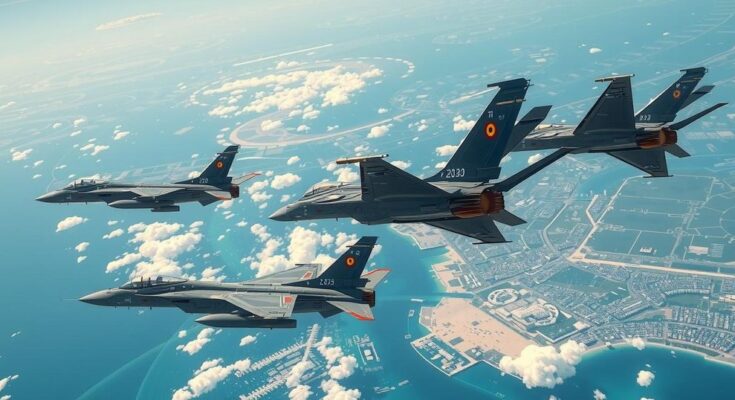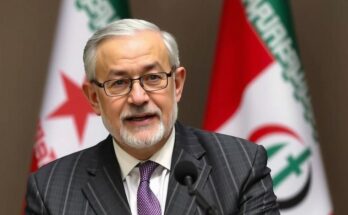Analysts are considering the implications of Russia potentially redeploying military forces from Syria to Libya as its position in Syria stabilizes. Given its strategic interests, maintaining influence in the Mediterranean is vital for Moscow. This transition poses risks, including empowering Libyan military leader Khalifa Haftar, amid ongoing instability in Libya’s political scene. Russia’s actions may significantly affect European security interests, highlighting the need for increased international awareness.
As analysts contemplate Russia’s military reconfiguration following its involvement in Syria, there is growing speculation regarding the nation’s potential shift towards Libya. While the loss of Syrian territory is not expected to have significant material repercussions for Russia, it is crucial for the Kremlin to maintain its geopolitical leverage along the Mediterranean and in Africa, areas where it has cultivated considerable influence over the past decade. The degradation of Russian military positions in Syria, particularly the air base at Khmeimim and the naval base at Tartous, creates a pressing need for alternatives, with Libya being the most viable option for Moscow.
Since 2017, Kremlin strategists have eyed Africa as a critical area in the global power contest. Particularly, there is a military presence across the continent through the Africa Corps, formerly known as the Wagner Group, which supports various regimes in countries such as Mali, Burkina Faso, and Niger. Libya, with its strategic location, offers Russia essential leverage to project power into Europe and disrupt Western interests. However, there are currently no signs of an impending Russian military buildup in Libya, indicating a cautious approach to expanding its footprint amidst Libya’s own internal discord.
Libya’s political landscape has remained unstable following the 2011 uprising, marked by two rival governments both claiming authority. The Government of National Stability in the east, supported by military commander Khalifa Haftar, and the internationally recognized Government of National Accord in the west face ongoing tensions exacerbated by negotiations for national elections. Should Russia decide to consolidate its military presence in eastern Libya, analysts warn that it could further empower Haftar, undermining prospects for genuine political negotiations and potentially establishing a military hub that would challenge Western interests in the region.
Despite the growing influence of other powers like China and Turkey in Africa, Russia’s sustained military engagement remains a critical factor concerning European security. Western nations have attempted to engage with Haftar to mitigate irregular migration and energy supply concerns, although it remains evident that he has become a considerable ally of Russia since Moscow’s involvement in the Libyan civil war in 2020.
The delicate balance resulting from Russia’s ambitions in Libya could prompt a reconfiguration of military dynamics in North Africa and beyond. This shift poses potential risks, as Haftar’s growing power with Russian support may lead to an erosion of sovereignty in the region, complicating diplomatic relations and security in Europe. In conclusion, while the possibility of Russia’s relocation from Syria to Libya is not without challenges, the implications for geopolitical stability in the Mediterranean remain profound and warrant careful international consideration.
The discourse surrounding Russia’s military strategy has gained significance due to its recent activities in Syria and the potential ramifications of those actions in Libya. As Russia’s involvement in Syria seemingly winds down, analysts are scrutinizing the implications of a possible redeployment to Libya, where existing military ties and strategic interest could be leveraged to retain influence in North Africa and the Mediterranean. This is especially pertinent given the historical context of Russia’s efforts to solidify its presence in Africa and counter Western influence. Libya’s fractured political landscape presents both opportunities and challenges for Russian maneuvers as it seeks to bolster its power in a region fraught with instability and conflict. As the UN endeavors to facilitate national reconciliation in Libya, any substantial Russian military engagement could significantly alter the dynamics of power and influence among local and foreign actors.
In summary, the potential redeployment of Russian military forces from Syria to Libya presents significant geopolitical implications that extend beyond the bilateral relations between these nations. Russia aims to preserve its strategic influence, particularly in light of its recent setbacks in Syria. However, this ambition intersects with the complex internal conflict in Libya, where increased Russian involvement risks exacerbating existing tensions and empowering local factions like Haftar. Given the intricate geopolitical landscape, the international community must closely monitor Russia’s actions and their potential consequences for stability in both Libya and the broader Mediterranean region.
Original Source: www.aljazeera.com




